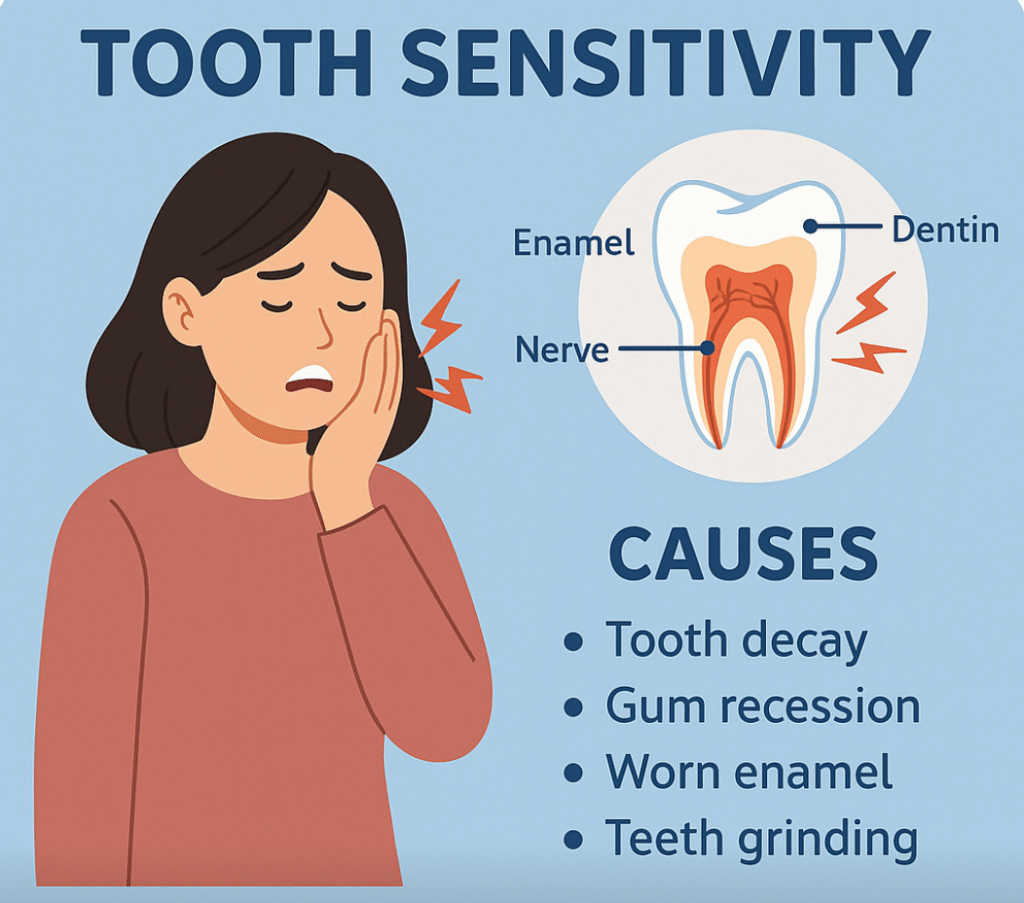Tooth sensitivity, also known as dentin hypersensitivity, is a common dental issue that affects millions of people worldwide. It is characterized by a sharp, sudden pain that occurs when teeth are exposed to certain stimuli — typically cold, hot, sweet, or acidic foods and beverages. This pain can range from mild discomfort to severe, lingering ache, indicating underlying enamel or gum issues.
🧩 What Causes Tooth Sensitivity?
- Tooth Decay (Cavities)
Cavities erode the enamel — the outer protective layer of the tooth — exposing the sensitive dentin underneath. When the dentin is exposed, external stimuli can reach the tooth’s nerves, causing pain. - Gum Recession
Over time, aggressive brushing, gum disease, or aging can cause gums to recede. This exposes the tooth roots, which are not covered by enamel, making them more sensitive to temperature changes and acidic foods. - Worn Enamel
Enamel wear can result from acidic diets, teeth grinding (bruxism), or overuse of whitening products. Once enamel thins out, it cannot regenerate naturally, leaving teeth vulnerable. - Teeth Grinding
Habitual grinding or clenching, often during sleep, can cause microfractures in enamel and expose inner layers of the teeth, leading to persistent sensitivity. - Dental Procedures
After fillings, whitening, or cleanings, temporary sensitivity can occur. This usually subsides within a few days, but chronic sensitivity may suggest a deeper problem.
⚕️ Recognizing the Symptoms
- Sharp or shooting pain when eating or drinking hot, cold, sweet, or sour foods
- Discomfort when brushing or flossing
- Sensitivity localized to one tooth or generalized across several
- Occasional spontaneous pain without a clear trigger
🪥 Prevention and Care Strategies
1. Use Desensitizing Toothpaste
Formulated with compounds like potassium nitrate or stannous fluoride, these toothpastes block nerve signals and build protective barriers over time.
2. Maintain Gentle Oral Hygiene
Use a soft-bristled toothbrush and brush at a 45-degree angle to avoid damaging gums and enamel. Avoid overbrushing or using abrasive toothpaste.
3. Limit Acidic and Sugary Foods
Acidic beverages like soda, citrus juices, and wine can erode enamel. Rinse with water after consuming them to neutralize acids.
4. Address Bruxism
If you grind your teeth at night, consult a dentist about using a mouthguard to prevent enamel wear.
5. Visit the Dentist Regularly
Routine checkups allow early detection of decay, gum disease, or enamel wear. Professional fluoride treatments or sealants can also help protect sensitive areas.
🌿 Long-Term Outlook
While tooth sensitivity is rarely dangerous, it can signal more serious dental issues such as cavities, infection, or gum disease. Early intervention and proper oral care can significantly reduce discomfort and prevent progression.
🇰🇷 Premium Korean Ginseng Online Shop







